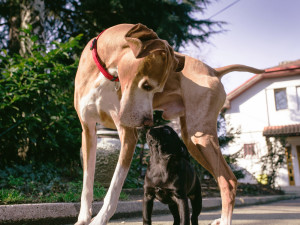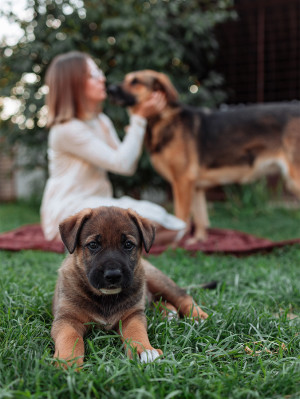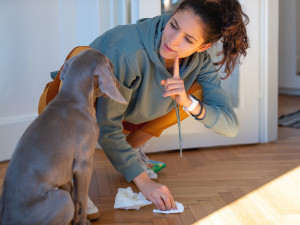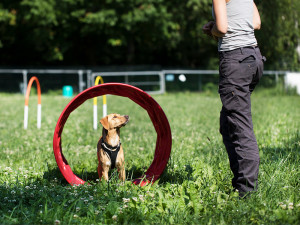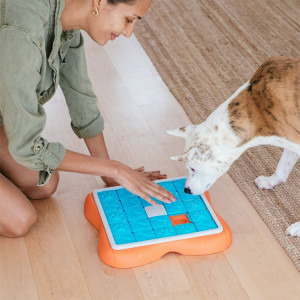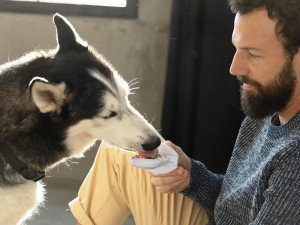How Young Dogs Can Benefit From Having an Older Dog Mentor
Having an older, wiser dog around can be a big plus
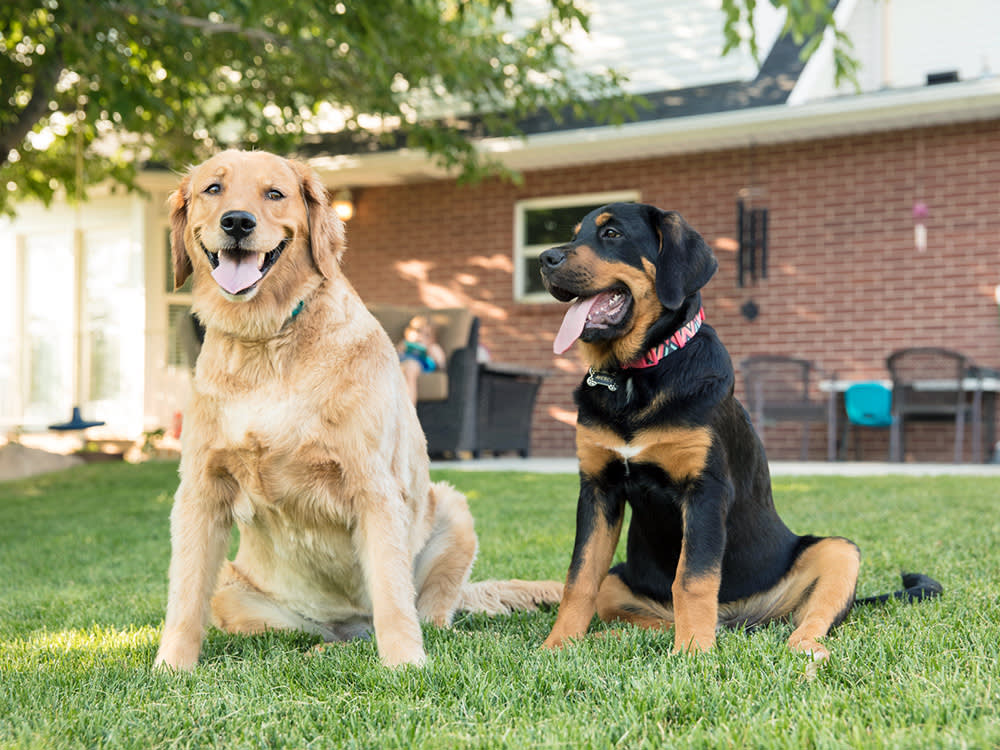
Share Article
Life is an adventure, and having someone to guide us through its challenges is a blessing. My mentor is Patricia (Trisha) McConnellopens in new tab, PhD, and she has taught me so much about everything related to my work – understanding canine body language, working with clients, keeping myself and others safe around aggressive dogs, running a business, writing books and so much more. Trisha and I share a great love for both people and dogs (our two favourite species) and I think pups deserve mentors every bit as much as humans do.
Dogs definitely benefit from having mentors – usually in the form of an older dog in the home who shows them the ropes, helps them learn and teaches them so much. Mentoring is the informal sharing of knowledge, skills and support by someone with greater wisdom and experience to someone with less wisdom and experience. Lucky are the dogs who are mentored by a wiser, more experienced dog. There are great benefits in a puppy or young pup having a mentor. They can learn from mentors, adjust more easily to new experiences and receive comfort from them.
What can dogs learn from a dog mentor?
One of the best things a young dog can learn from an older dog is the concept of boundaries, socially speaking. Many older dogs will let an energetic youth know when enough is enough or that certain behaviours are not tolerated. For example, if a young dog is relentlessly leaping on an older dog, trying to get them to play when that older dog is done and having a rest, the senior of the two may offer guidance.
I’ve seen an older dog put their paw on top of the younger dog, growl at them or even place their own mouth over their muzzle. All of these actions by the older dog, if done gently and appropriately, tell the little tyke to knock it off. And the younger dogs generally learn that when an older dog is not responding to their attempts to play, they should go find something else to do and quit bothering them.
I cannot emphasise enough how important it is that this boundary setting by older dogs should be calm, fair and measured. The idea is to teach (mentor) the little one, not scare them or upset them. Setting boundaries helps young dogs learn what is allowed and what is not and helps them develop self control. This behaviour also gives them valuable practice being frustrated about not always getting what they want and helps them develop good canine social skills.
Many people swear their older dog helped house train their younger dog. By heading outside to pee and poo, these older dogs are scent-marking the outdoors, including the garden, which helps puppies learn the location of the canine bathroom. The younger dogs may see their mentor going, too, though the odors are probably a critical part of the mentoring about where to go. Guiding a young puppy to the proper spot is a helpful lesson that should give people everywhere cause to be grateful.
There is a lot of controversy about whether dogs are capable of observational learning, but anecdotally, many people swear their dogs watch and learn when they pay attention to other dogs. It’s common for people to report saying ‘sit’ and giving a treat to their older dog when they respond correctly, followed by the younger dog looking at the older dog, and then hesitatingly sitting as though considering, “Am I doing this right?”
Mentoring is also extremely helpful when teaching a new dog to come when called, though this can only happen if the older dog has a solid recall. If you call out, ‘Come!’ and the older dog turns and runs towards you, the younger dog is likely to follow along, just because chasing is so natural for dogs, and younger dogs so often follow older ones around. If the older dog responds to this cue, the younger dog has a greater probability of heading in your direction than they would if they were alone. Then, when the dogs reach you, you can reinforce them both, which allows you to start building a strong reinforcement history with the younger pup. In this way, the mentor-dog plays a big role in guiding the younger dog to good behaviour and solid training.
Speaking of play, it’s often far easier for a dog to learn to play from an older dog who mentors them than from a human, however playful and motivated that human may be. Teaching a dog to play can be a wonderful form of mentorship, especially for dogs who may have come from a bad situation and not had the opportunity to be joyfully playful and happy. Many puppies have learned how to play and enjoy life from the lessons of a mentor-dog.
Mentor-dogs teach their young charges a lot when it comes to communication. There’s just no getting around the fact that dogs ‘speak canine’ as native speakers, and we humans must learn it as a foreign language. The daily interaction with another dog is a valuable type of mentorship for keeping those canine communication skills in order, and for learning them in the first place.
How does a young dog benefit from having an older dog mentor?
It’s a pretty shocking experience for dogs to go from being with their mother and their littermates to being placed in a totally different home away from them. Plus, they have to get to know new people and maybe new dogs. And, for pups who are rehomed when they are past the young puppy stage, it’s just as shocking to land in a new family with so many adjustments required.
Many dogs seem more comfortable during these transitions when there is another dog who is kind, patient and friendly present. It’s not unusual for young dogs to act as though they feel very secure having such an older one present in their lives – a kind and loving mentor to show them the ropes.
Having another dog as a mentor may mean dogs are more relaxed and better able to settle down to rest and to sleep. A pup snuggling up against an older dog with a contented sigh and then drifting off is so touching. Observing such a moment is practically enough of a reason to add another dog to your household. (Feel free to tell your partner I said so...)
Having a mentor is so helpful for fearful dogs, especially those from puppy mills or rescued from hoarding situations; these dogs are almost always more comfortable with dogs than with people. Any dog who has been around other dogs a lot but has limited experience with people will benefit from having a canine-mentor as a guide and friend in their new home.
Just having an affable buddy may mimic some of the mentorship benefits of a truly stable dog who guides them. Joining a household with a dog can be especially beneficial to young and energetic dogs. Such dogs may get into trouble less with another dog around because of the extra exercise and stimulation of play, as well as other interactions, add to their feelings of contentment and minimises the boredom that can make problems more likely. If a true mentor of a dog also becomes a dear friend, so much the better.
What kind of dog makes the best mentors?
Not just any individual can be a mentor. They are not all suited for success in this role. The origin of the concept of a mentor in the human world comes from ancient Greece. In Homer’s epic poem The Odyssey, when Odysseus left to fight in the Trojan War, he asked a trusted family friend to watch over his son, Telemachus. He chose carefully, picking a man who has been described as a protective, supportive person. This man acted as a trusted advisor to Telemachus, providing wise counsel and guidance, and his name was Mentor.
The best dog mentors are outgoing, sociable, and agreeable. They enjoy interactions with both people and dogs and are comfortable with a wide variety of situations. They can handle the unexpected and are able to deal with changes in their lives and to the routine. They are typically relaxed as they go through life, and have medium levels of energy – enough to be interactive and up for all kinds of activities including play, but not so peppy that they overwhelm those around them with relentless motion. Mentor-dogs need to be good at understanding other pups so they react appropriately to a new dog’s changing emotions.
I’m certainly grateful for the guidance and the knowledge my mentor has shared with me, and I wish the same good fortune for all people and for all dogs.

Karen B. London, PhD, CAAB, CPDT-KA
Karen B. London, Ph.D., is a Certified Applied Animal Behaviorist and Certified Professional Dog Trainer who specializes in working with dogs with serious behavioral issues, including aggression, and has also trained other animals including cats, birds, snakes, and insects.
Related articles
![a brown puppy and a dog of different ages sit with person on grass]()
Your Dog’s Personality Can Change Over Time
You won’t live with a rambunctious goofy teenager forever
![A woman cleaning up pee on the wood floors inside while disciplining a grey puppy with a raised finger of disapproval]()
10 Dog Training Habits You Should Drop Right Now
Training a dog can seem pretty intuitive – until it’s not
![A puppy practicing obstacle training courses with owner.]()
5 Reasons to Start Agility Training With Your Puppy
Learn how to better communicate with your puppy through agility training
![Woman and white dog playing with puzzle.]()
6 Genius Interactive Dog Toys From Nina Ottosson
These puzzle toys are made to help you bond with your pup
![A bearded man in a gray sweater and yellow pants sitting on the floor and holding a Groov Training Aid in "lilac" from Diggs Pet, which is like a grooved plastic popsicle with treats smeared in, while his Husky dog licks it]()
8 Stress Toys For Dogs That Are Cheaper Than Therapy
The toys that’ll help your pup chill out after a long day of being a dog



